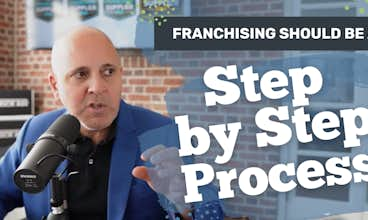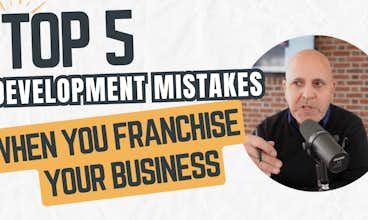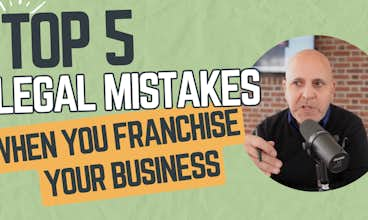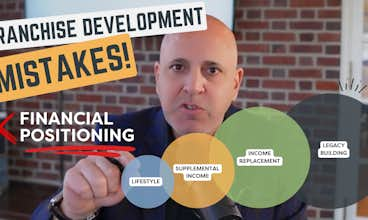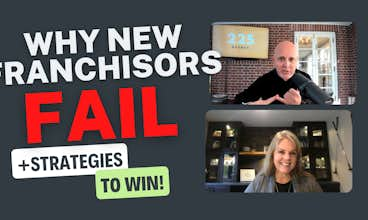Evaluating Your Sales Before Franchising
Before franchising, evaluate your sales to make sure future franchisees can duplicate your financial performance.
Takeaways:
Being a franchisor is about helping franchisees succeed, so it’s critical that your sales are strong enough to franchise your business.
You can make sure your brand is positioned for success by evaluating gross sales, industry benchmarks, financial performance relativity and more.
By confirming that your numbers are good enough, you can meet or exceed your franchisees’ expectations.
As a new franchisor, some of the most important data future franchisees will ask to review before investing in your brand will be the Item 19 financial performance representations in your Franchise Disclosure Document (FDD).
From your financial performance to the gross sales of your business, cost of goods sold, operating expenses, labor costs, gross profits and more, the information contained within Item 19 is critical for helping prospective franchisees determine whether a franchise is worth investing their money in. Because of that, it’s important to evaluate whether your business’s sales – and profits – are good enough before franchising.
Below, we’ll explore the key factors every aspiring franchisor should evaluate before transforming your business into a franchise system.
How to evaluate your sales before franchising
Although it might be tempting to look only at your business's sales numbers when you’re considering franchising, it’s important to understand that sales numbers alone aren’t enough to determine whether a business is in the right financial position to franchise. Instead, business owners should evaluate specific business and economic factors before making a decision.
1. Evaluate sustainability indicators
As a successful business owner, you probably already know that having strong sales is important. When it comes to franchising, though, sales can make or break your brand’s sustainability. Business owners should analyze the key indicators for building a sustainable franchise system before franchising, including:
Gross sales
Operating costs
Cost of goods sold
Food costs (for restaurants)
Labor costs
Operating profits
2. Make sure franchisees can replicate your business’s financial performance
When evaluating the economic factors that can determine whether your business is franchisable, it’s also important to establish whether future franchisees will be able to replicate your financial performance at their own franchise locations after an initial period of organic growth.
Because new franchisees will likely have higher costs when they’re starting out, including elevated supply chain expenses and the obligation to pay royalty fees, they might not be able to reach your business’s level of profitability immediately after opening. However, as an aspiring franchisor, it’s important to make sure there’s a good pathway for franchisees to generate sufficient cash flow and income to achieve a similar level of profitability within a few years after opening.
At a basic level, this can usually be determined by analyzing your business’s current sales, profits and margins. If your current numbers were replicated by franchisees, would they be profitable? Would they be able to generate sufficient income even after accounting for additional expenses like royalties and other fees?
3. Evaluate the franchising factors
Although operating a profitable business is an important factor when it comes to franchising, profitability isn’t enough on its own to determine whether your business is ready to franchise. For aspiring franchisors, it’s also important to make sure your business can stand up to its competition.
Industry benchmarks
When determining whether your sales are good enough to franchise your business, consider how your financial performance compares to other similar businesses within the same industry. To figure out your business’s positioning, identify benchmarks that can help determine what success looks within your industry:
How do your gross sales compare to your competitors?
Are your metrics consistent?
Are you a top performer or a mid-level player in your industry?
What do your KPIs look like?
If you're a retail-based business, how does your rent compare to other retailers with the same square footage?
Franchise brand competitors
While having the ability to compete with other businesses in your industry is critical for success, it’s also important to evaluate how your business might stack up against competitors in the franchise space. By comparing your business’s Item 19 financial performance representations to those of entrenched competitors that are thriving and growing as franchise brands, aspiring franchisors can get a sense of where they might stand after entering the franchise world.
When comparing your business’s financial performance to the Item 19 disclosures of similar franchise brands in your industry, ask how your business’s sales compare to those of the brands you’re evaluating. How do your unit metrics compare to what your competition is disclosing in their Item 19 representations? Are your sales in the top 50% of what another franchise is reporting for their franchisee sales? Is your business’s financial performance competitive with those brands?
If you find that your numbers aren’t competitive enough, take the time to figure out where you can improve. Even if it isn’t the right time to franchise your business, that doesn’t mean you should give up. Instead, work on upgrading your financial performance and positioning your business to be more competitive.
Even if your business exceeds industry standards, though, your work as an aspiring franchisor isn’t done – there’s still more to analyze before deciding whether your sales are good enough to franchise your business.
4. Remember that financial performance is relative
Despite being overlooked by many startup franchisors, understanding the concept of financial performance relativity is critical for ensuring franchise sales success – and knowing whether your business is in the right position to franchise.
To find out how your brand’s financial performance relates to competitors in your industry, start by looking at your business’s estimated startup expenses, gross sales and the potential return on investment (ROI) for your franchisees. If your gross sales are $1 million and you think future franchisees could scale to that level over time, figure out how much money a franchisee would have to invest to reach that level. When determining a franchisee’s initial investment, remember to consider leases, location build-out costs, startup expenses and other similar factors.
Since brick-and-mortar brands will likely require larger upfront investments than remote service-based franchises, aspiring franchisors should know that the speed of a franchisees’ ROI will vary from business to business. It’s also important to remember that having high gross sales isn’t everything when it comes to franchising. A business with lower gross sales but higher margins, a smaller footprint and lower estimated startup costs might still be competitive relative to brands with higher gross sales.
Initial investment disclosures
Aspiring franchisors should keep in mind that estimated startup expenses for opening a franchise location must be disclosed to franchisees in Item 7 of the FDD. Those disclosures include all the expenses franchisees should expect to incur from the date they sign the franchise agreement to the date they open their franchise business – and sometimes even three months of reserve capital.
Because of that, it’s a good idea for potential franchisors to evaluate their gross sales and operating profit potential relative to estimated startup costs before franchising to ensure their system will be sustainable.
5. Take franchisee expectations into account
Because your future franchisees will likely be making a significant investment in their franchise business, it’s important to keep their expectations in mind when deciding whether to franchise your brand.
From income replacement to lifestyle, wealth-building and high-investment franchises, franchisees have a variety of reasons for wanting to buy a franchise. By understanding what might motivate a prospective franchisee to buy a franchise from you in the future, you can determine whether your sales will meet – or even exceed – their expectations.
Becoming a franchisor isn’t something business owners should take lightly. Franchising a business is about empowering franchisees and taking on an obligation to help them succeed. By making sure your sales are good enough to support future franchisees, you can position your brand – and your future franchisees – for success before offering your first franchise. Watch the video below to learn more.



